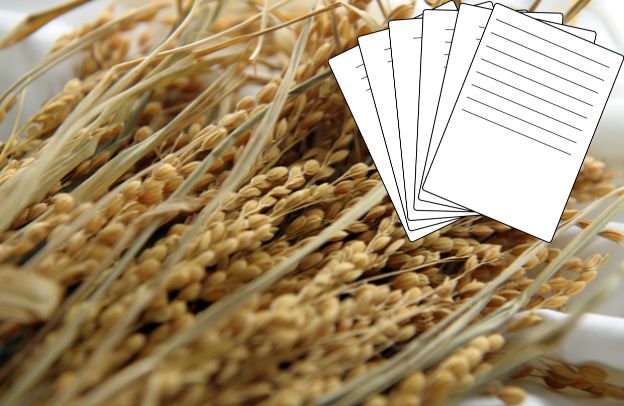African Rice Evolution and Technology: Building a Legacy of Collaboration, Innovation

It seems you are at a crossroads. The global food market’s eyes are on Africa, a continent with vast agricultural potential, rich soils, and one of the world’s youngest populations. Now, you, as an entrepreneur in the African diaspora, see this as more than an economic opportunity, but a chance to rewrite your legacy by feeding your people, creating wealth, and shaping the narrative of Africa’s future.
Want to learn more about storytelling? Start by downloading the first chapter of The Storytelling Mastery.
Rice, the continent’s staple, holds the promise of feeding millions, creating jobs, and transforming agribusiness.
Driving Sustainability in Rice Production: A Unified Global Effort
In a recent report by the Food and Agriculture Organization (FAO) titled “FAO and the GEF: Partnering for Sustainable Agri-food Systems and the Environment”, a critical milestone was highlighted.
On September 13, 2024, representatives from eight countries across Asia and Africa convened in Hanoi, Vietnam, as part of the FAO and IFAD-led GEF-8 Food Systems Integrated Program (FSIP).
Their goal was to chart a unified approach toward sustainable rice production while advancing the FSIP’s mission of creating food systems that are sustainable, regenerative, inclusive, resilient, and pollution-free.
This gathering couldn’t have been timelier. Just days before the workshop, Vietnam faced one of its strongest storms in over three decades. The storm devastated communities, infrastructure, and agriculture, highlighting the urgent need for resilient agricultural systems in a country where rice is both a staple food and a cornerstone of livelihoods.
The Call for Sustainable Rice Production
Rice, alongside, cassava wheat and maize, is among the most crucial staple crops for global food security. However, conventional production methods are straining ecosystems and depleting resources. Transitioning to sustainable practices is no longer optional, but a necessity.
To reduce environmental impacts while ensuring food security and livelihoods, a multi-faceted approach is essential:
- Adopting Better Practices: Efficient water management, reduced use of harmful chemicals, and improved soil health are critical for reducing the environmental footprint of rice farming.
- Promoting Crop Diversification: Integrating other crops alongside rice not only enhances biodiversity but also strengthens farmers’ resilience to market and climate fluctuations.
- Strengthening Local Food Systems: Balancing international trade with robust local systems ensures communities are less vulnerable to global supply chain disruptions and more self-reliant in meeting their food needs.
By prioritizing sustainable rice production, we’re not only protecting the environment but also fostering resilience in the millions of lives directly and indirectly tied to this vital crop. This unified global effort is a step toward securing a future where food systems are not only productive but also sustainable and equitable.
But, how do you make your mark in this massive industry? How can you compete while staying authentic and driven by purpose? This is where collaboration, innovation, and the power of storytelling come in.
The State of Rice in Africa: Potential Meets Opportunity
The demand for rice in Africa has been steadily increasing, fueled by population growth, urbanization, and changing dietary preferences. In Nigeria alone, rice consumption exceeds 7 million metric tons annually, making it the largest consumer of rice on the continent (FAO, 2022). However, a staggering 60% of this demand is met through imports, highlighting a significant gap in local production.
The Missed Opportunity
This heavy reliance on imports represents more than a trade imbalance and that is a missed opportunity for Africa’s agricultural sector. By not fully capitalizing on the growing demand for rice, local farmers and agribusinesses lose out on economic growth, job creation, and the chance to strengthen food security.
Each grain of imported rice is a reminder of the untapped potential within the continent’s fertile lands and skilled labor force.
Turning Challenges into Opportunities
To reduce dependency on imports and empower local farmers, the focus must shift to scaling up domestic rice production. Here’s how:
- Investing in Modern Farming Techniques: Mechanized farming, improved irrigation systems, and high-yield seed varieties can significantly boost productivity.
- Building Stronger Value Chains: From production to processing and distribution, strengthening value chains ensures farmers gain better access to markets and fair prices for their efforts.
- Policy Support: Governments must prioritize policies that encourage local production, such as subsidies for inputs, improved infrastructure, and import tariffs to protect domestic farmers.
- Promoting Agripreneurship: Empowering the next generation of African entrepreneurs to explore rice farming and processing can foster innovation and attract private investments.
The Way Forward
Reducing Africa’s reliance on imported rice is not just about meeting current demand—it’s about future-proofing the continent against global supply chain disruptions, price volatility, and food insecurity.
A shift toward local production will not only boost farmers’ incomes but also retain economic value within Africa, creating a ripple effect of growth across industries.
With coordinated efforts, Africa can transform its rice sector into a thriving industry that meets the needs of its people while showcasing the continent’s agricultural potential to the world. The time to act is now.
Why does this matter to you?
Because every grain of imported rice is a missed chance to grow local economies, create jobs, and ensure food security. As an African diaspora entrepreneur, you can bridge this gap by bringing innovation, investment, and strategic partnerships into rice farming, processing, and preservation.
See also Best Marketing Strategies for Small and Medium-Scale Farmers in African Agribusiness
The Evolution of Rice Processing Technologies: From Traditional to Modern
Traditionally, rice processing in Africa has been a labor-intensive endeavor, involving manual pounding, threshing, and winnowing. It’s backbreaking work, fraught with inefficiencies and significant losses due to grain breakage.
Perhaps you’ve heard the stories from elders—of the relentless toil required to produce a single bag of rice, often with little to show for the effort.
But those days are fading. The winds of change are sweeping through Africa’s rice industry, fueled by modern technologies that are revolutionizing the way rice is processed. Advanced rice mills, parboiling units, and digital grain sorters are now leading the charge.
Why Modernization?
These technologies are more than just labor-saving devices; they are game changers:
- Faster Processing: Automation reduces processing time, enabling farmers and processors to handle larger volumes efficiently.
- Minimized Grain Losses: With less breakage, more of each harvest can be sold or consumed, directly impacting farmers’ incomes.
- Enhanced Quality: Modern equipment improves the nutritional value, texture, and appearance of rice, making it more competitive in both local and international markets.
Empowering Farmers and Communities
The adoption of modern rice processing technology also carries broader benefits. It reduces the physical burden on workers, creating opportunities for women and youth to participate more actively in the value chain. Local entrepreneurs can establish processing hubs, and foster job creation and economic growth within rural communities.
Bridging the Gap
While these advancements are promising, access to technology remains a challenge for many small-scale farmers. Governments, private investors, and development organizations must work together to:
- Subsidize the cost of modern equipment.
- Provide training programs for farmers and processors.
- Establish cooperatives that allow shared access to costly machinery.
A Bright Future Ahead
With the integration of these modern solutions, Africa’s rice industry is poised for a transformation. The days of manual toil are giving way to efficiency, sustainability, and economic empowerment.
What once seemed like an insurmountable challenge is now an opportunity to reimagine how Africa feeds itself—and the world.
See also Innovative Farming Techniques for Small and Medium-Scale Farmers in Nigeria
The future of Africa’s rice industry lies in modernization, collaboration, and innovation. Traditional methods of rice processing, though rich in heritage, limit productivity and efficiency. The time has come to embrace change and tap into the immense potential within the sector.
For example, a recent study by the African Development Bank (AfDB) revealed that introducing modern milling techniques to small-scale farmers can boost output by up to 40%, while significantly reducing waste and labor intensity. The opportunities are clear, and here’s where the focus should be:
- Invest in Small and Medium-Scale Processing Facilities
Equip local processing hubs with modern technologies like automated mills and digital grain sorters to enhance productivity and improve the quality of rice production. - Collaborate with Local Cooperatives
Partnering with farming cooperatives fosters resource sharing, reduces costs, and elevates the quality of processed rice. These collaborations also strengthen local economies and empower communities. - Leverage Digital Marketing and Storytelling
Build consumer trust and loyalty by sharing your mission and impact through compelling narratives. Use digital platforms to reach global audiences, showcasing the value of locally produced rice.
By focusing on these strategies, African rice producers can unlock new markets, reduce reliance on imports, and create a thriving industry that supports livelihoods across the continent. The path to transformation is clear—it’s time to seize the opportunity and lead the change.
The Power of Preservation: Protecting What You Grow
Let’s talk about preservation. In the past, rice was stored in traditional granaries, sun-dried, and left vulnerable to pests, mold, and spoilage. The losses were devastating, both financially and nutritionally. For an agribusiness entrepreneur, every lost kilogram of rice is money lost. But new preservation techniques are changing the game.
Imagine If you have harvested a bumper crop. Instead of risking spoilage, you use hermetic storage bags that keep moisture and pests at bay. Vacuum sealing extends the shelf life while retaining the rice’s nutritional value.
These technologies are now available, and the best part. They’re affordable for small-scale farmers with the right partnerships and support. The advantages are clear:
- Reduced losses due to insects, pests, and mold.
- Extended shelf life and nutritional retention.
- Lower dependence on chemical preservatives, contributing to safer food systems.
By adopting these technologies, you not only reduce waste but also ensure that every grain harvested contributes to feeding your community.
Collaboration and Building Together: A Call to Action
In agribusiness, collaboration isn’t just a buzzword but it is a necessity. You can’t do it alone, and you shouldn’t have to. As an entrepreneur in the diaspora, you hold a unique position to connect with local farmers, investors, and fellow diaspora networks.
Why collaboration works:
- Access to capital: Pooling resources with like-minded investors can help fund costly technologies like mills and storage units.
- Collective marketing power: Together, you can create branding campaigns, tell compelling stories, and build recognition for African rice on global markets.
- Shared knowledge and skills: Collaborate with local educational platforms, like AClasses Academy, to empower farmers with business and self-improvement skills.
AClasses Academy, for instance, offers tools for mastering digital marketing, supply chain optimization, and self-improvement skills. Imagine training local cooperatives to harness storytelling techniques to showcase their products and differentiate themselves in crowded markets. It’s about more than selling rice, it’s about selling a vision.
Telling the Story: Marketing Your Rice
Here’s the truth: consumers connect with stories, not just products. To stand out in the agribusiness market, you need to weave your journey, struggles, triumphs, and aspirations into your brand narrative.
Consider this: A young farmer in a remote village transforms their yield using modern techniques, doubling production and building a community school from the profits. That’s a story worth sharing. It resonates, inspires, and drives brand loyalty.
As a diaspora entrepreneur, your story, your connection to your roots, and your dedication to your community can move hearts and open wallets. Craft your narrative by focusing on:
- Authenticity: Share your “why” stating why you care about local agriculture, why it matters to you, and why it should matter to your consumers.
- Connection: Build trust with consumers by emphasizing your commitment to sustainable practices and community development.
- Consistency: Engage with your audience regularly through social media, blogs, podcasts, or events, reinforcing your mission and values.
Continuous Learning: Staying Ahead in the Game
Agribusiness is evolving rapidly. The challenges of climate change, fluctuating market demands, and technological innovation mean you must stay ahead of the curve. Your growth as an entrepreneur depends on continuous learning and self-improvement.
What can you do?
- Participate in online courses and workshops: Platforms like AClasses Academy offer resources tailored to agribusiness, covering topics from marketing to logistics.
- Network with industry experts: Attend conferences, join professional associations, and learn from the successes and failures of others.
- Mentor and be mentored: Share your expertise and seek guidance from those who have walked this path before you.
Check out AClasses Academy: Your Ultimate Learning Platform for Business and Self-mastery
Bringing it All Together: Investing in Africa’s Future
You have the power to create change. By leveraging modern technologies, building collaborative networks, and mastering the art of storytelling, you can revolutionize rice farming in Africa. This isn’t just about profit but it’s about feeding a continent, creating jobs, and building a legacy that your children’s children will remember.
Let’s rewrite the narrative of African agribusiness, one grain at a time. The journey is just beginning. Are you ready to take the first step?
See also Africa’s Agribusiness: Cultivating a Trillion-Dollar Future
This is more than just an article. It’s a call to action—a challenge to you, the African diaspora entrepreneur, to collaborate, invest, and innovate for a brighter future. The opportunities are vast, the potential is real, and the time to act is now.
Want to learn more about storytelling? Start by downloading the first chapter of The Storytelling Mastery.





